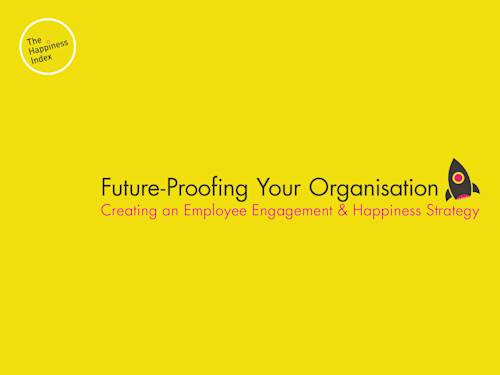
Creating an Employee Engagement AND Happiness Strategy
Feeling committed to our work and organisation is linked to our levels of engagement. Commitment is associated with the Reflective brain system in our neuroscience model.
If you've just landed on this page, we recommend reading our introduction to brain systems and the neuroscience themes for more context. Otherwise, read on for everything you need to know about how employee engagement can be driven by commitment to the workplace.
Commitment is a state of emotional attachment that makes us feel a sense of belonging and purpose. The journey to commitment takes place through emotional engagement, where we identify with a wider human group or purpose at a higher energetic level, which is described as passion.

Commitment involves trust and belonging, but unfortunately, we’ve lost this in institutions and corporations. We used to believe in and be loyal to certain institutions, organisations, and governments because we were tied to a stronger belief and higher purpose, which came from feeling a part of something much greater than ourselves. The challenge today is where is the faith in ourselves? Younger generations are more interested in protecting and sustaining the planet, so there’s a commitment there. People have a desire to believe in something beyond themselves, so they're looking to find it and seeking organisations that commit in return. There becomes a value exchange around what we believe in, which starts with a commitment to self.
In the UK, employees, on average, stay with an employer for three years. Many leaders operate in the lens that if someone leaves after three years, they’re disloyal. But from a leadership perspective, if you don’t give people the opportunity to grow and develop within your organisation, they’ll begin to look for greener grass. People will graze in places that give them opportunities to grow. Organisations need to make an investment in development and people. We’ve got to move away from solely focusing on having the highest profits and focusing on keeping the best people. If we constantly invest in our people, giving them opportunities to grow, then maybe three years will move to five years.
Be brave enough to open up a dialogue with your leadership team, without blame or judgement, to have conversations about where you are and what you want to build. Also, have a brave conversation with your board to get them aligned. If these two aren't in place, then you don't have the commitment and the vision for what you want to create in the future. Too many initiatives don’t get the buy-in because they were started in the middle before commitment and vision were established.
We have a primal need to belong, so if we start with a premise of empathy, we can have better conversations that will strengthen our relationships. We’re in a place where people are fearful to say anything that’s too far left or too far right (even if they truly believe it); they’d just prefer to tread safely in the middle. Often leaders are afraid to have these courageous conversations because they are worried they might let people down or offend them. But rejection leads to redirection. People want to have these courageous conversations with their managers and leaders, so we need to do more to educate and coach in the development of human skills.
We can't be happy all the time. We’re imperfect, which is what makes us human. The key is having empathy for yourself. The more empathetic you are with yourself, the more empathetic you become with others. As leaders, we’ve got to think of our people as human beings. We’ve got to check in with them before we go straight into the agenda of the meeting. This builds a human element in to teams and organisations. When we go straight into agendas, we're treating people like bots. We are in a space where we’re being challenged with so many distractions now more than at any other time in history, so we to be empathetic with ourselves, understanding we’re not superhuman and neither are our people. Our expectations of ourselves and our teams could lead to stress and burnout. The constant pressure to reach unrealistic expectations will not drive growth. Empathy can allow people to achieve a healthier mental and physical state in which they will perform better.
Our job title is not our identity. We weren't born as a job title. This re-education of what a career is, in modern-day terms, is not a career ladder but one that's consistently evolving and growing. If we only educate people to think about a career ladder as progression and promotion, we are leaving out career happiness. Where is the sense of meaning and purpose, of making a difference? Where is the sense of working in a thriving environment? These are the questions we need to consider when taking stock of our careers. This means taking a step back and thinking bigger picture rather than an external, extrinsic perspective.
*This is an excerpt from the Happiness and Humans Podcast with John Fitzgerald. Click here to listen to the full podcast.

Linked to Engagement in our neuroscience methodology... learn more
The Happiness Index helps organisations measure the key employee engagement AND happiness drivers to power their people strategy.
Our unique platform offers the products, insights and tools to shine a light on your cultural health and empower management to drive thriving cultures.
Our neuroscience-based pre-built surveys measure the full employee experience - from onboarding to exit to empower and enable organisations to understand their people and create data-led action plans.
